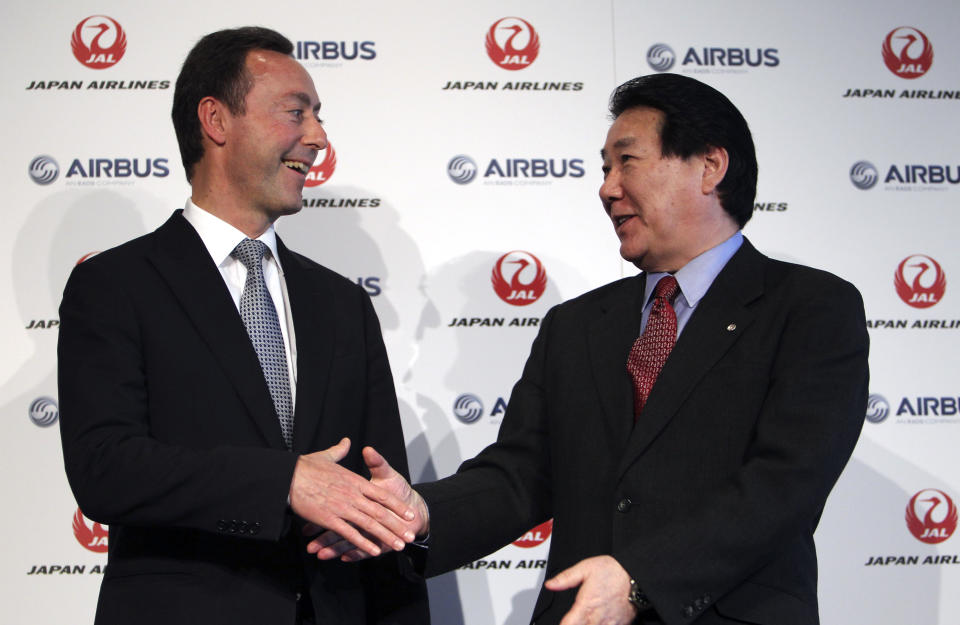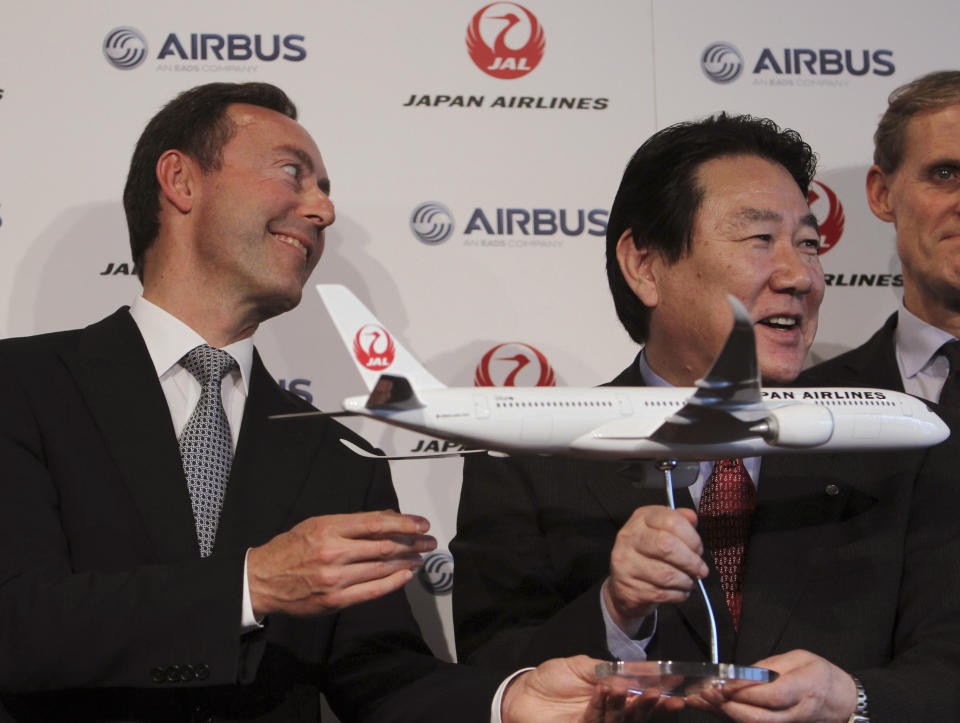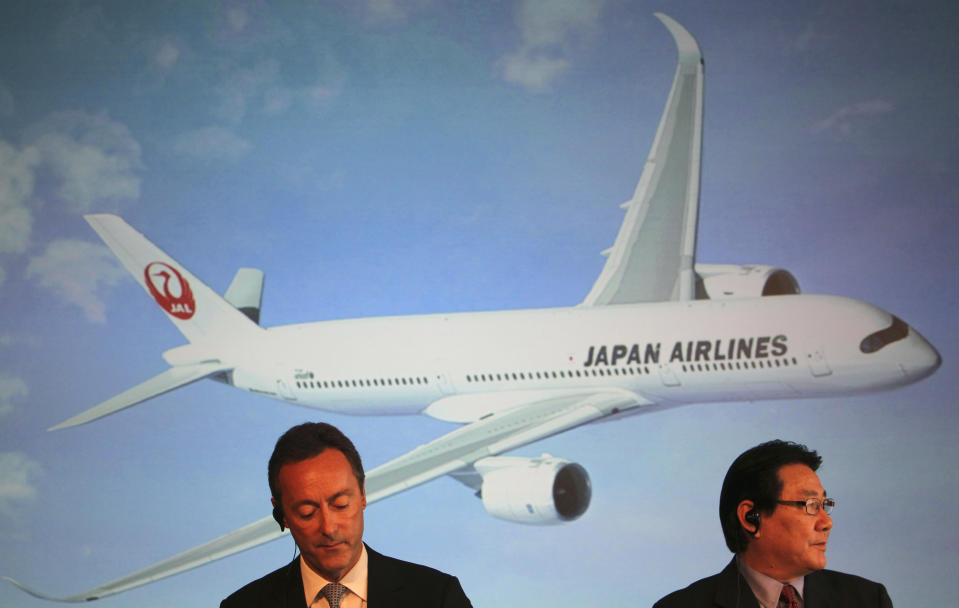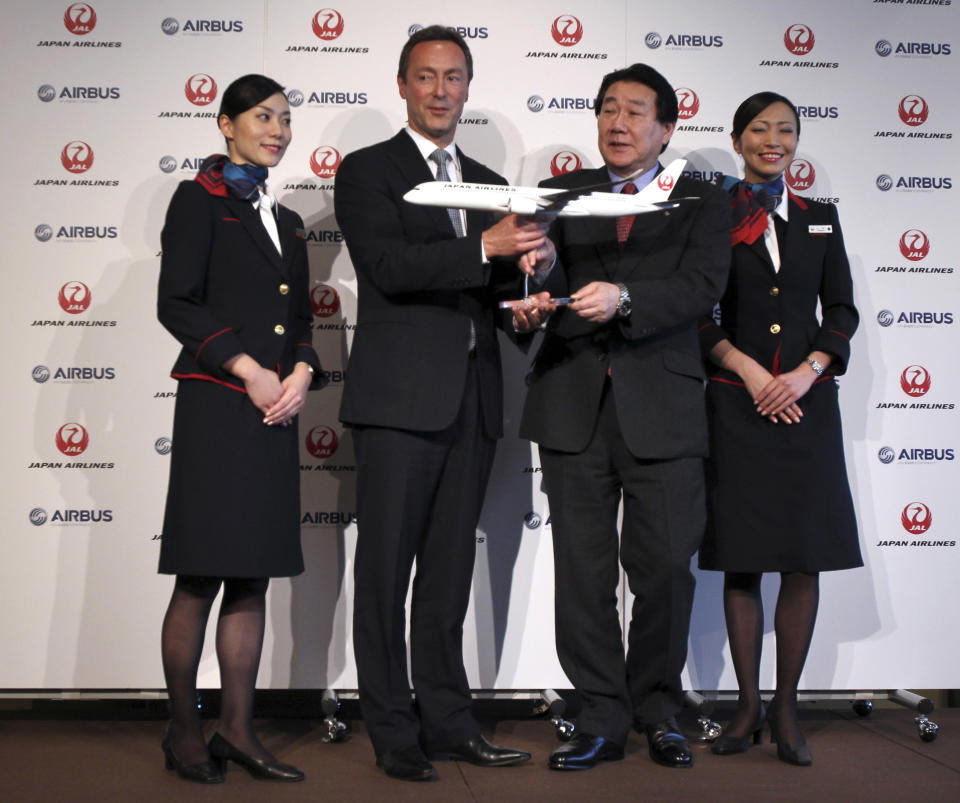JAL makes first purchase from Airbus, not Boeing
TOKYO (AP) — Airbus secured its first-ever order from Japan Airlines on Monday, in a deal that undermines Boeing's long-held dominance of Japan's aviation market.
Japan Airlines is to buy 31 A350 planes from the European aircraft manufacturer. The purchase has a list value of 950 billion yen ($9.5 billion) and marks a big change in policy as Boeing had been JAL's major supplier for decades. JAL also has an option to buy 25 more Airbus planes.
No official price was given, but airlines usually get discounts on the list price when making big orders. Some analysts even think that JAL may be getting the planes at below cost as Airbus looks to make inroads in a part of the world that has been primarily Boeing's domain for decades. Since the end of World War II, the U.S. and Japan have been big trading partners.
Amid much fanfare, Airbus Chief Executive and President Fabrice Bregier and Japan Airlines President Yoshiharu Ueki signed the deal in Tokyo in Monday. Ueki said the decision to turn to the Toulouse, France-based manufacturer for the replacement of its retiring Boeing 777 jets is unrelated to the problems that have plagued Boeing's rival offering, the 787 Dreamliner.
Earlier this year, the 787s were grounded for four months to confirm their safety after several of their lithium-ion batteries overheated. The batteries are now encased to prevent any overheating from spreading.
The 787's launch also was repeatedly delayed, with it finally making its entry into service in 2011, frustrating JAL as well as rival All Nippon Airways, Japan's other major carrier.
"We are sorry for the troubles we have caused our customers with the 787, but the decision on the aircraft was considered separately from that issue," Ueki told reporters.
He repeatedly said the long-range, twin-engine wide-body A350 was chosen because it was the "best match for our needs."
He brushed off concerns about the additional training JAL pilots will need to fly Airbus planes, which they are not used to. Even after taking such costs and risks into account, the A350 was the best choice, he said without giving specifics.
Airbus and Boeing have for years waged a no-holds-barred slugfest in markets around the world. This commercial battle has also spilled over into a yearslong legal fight at the World Trade Organization between the two plane makers over government subsidies or other forms of state aid.
Lately the battle has focused on sales of the next generation of long-range, wide-bodied jets. In that matchup, Monday's order represents a big coup for Airbus.
Will Horton, senior analyst at CAPA Centre for Aviation, thinks JAL likely got a good discount from Airbus, which has been eager to break into the tough Japanese market.
"They may have been sold at cost, or below cost," he said.
JAL has wanted an aircraft like the A350, which is smaller than Boeing's 747 jumbo jets but slightly bigger than the 787, Horton said.
London-based aerospace analyst Howard Wheeldon said the motivation behind the deal was probably not just price. He said JAL appears to be copying the strategy of other airlines like British Airways and United Airlines in operating a mixed fleet.
"This is a great day for Airbus and one that is the result of a huge amount of effort," Wheeldon said. "But while Boeing may be disappointed to see that their big European competitor has made a big dent into a one of its traditional customers, this does not in my view signal anything other than a desire by JAL to operate a mixed fleet of the best available aircraft in the world."
Behind the domination of Chicago-based Boeing Co. are the historical ties between Japan and the U.S., including security arrangements. But in recent years, other Japanese carriers, especially newer low-cost airlines, have been gradually switching to Airbus.
Boeing said Monday's deal did not hurt its relationship with JAL.
"Although we are disappointed with the selection, we will continue to provide the most efficient and innovative products and services that meet longer-term fleet requirements for Japan Airlines," it said in a statement. "We have built a strong relationship with Japan Airlines over the last 50 years and we look to continue our partnership going forward."
Boeing spokesman Rob Henderson said the company was preparing the 777X as a replacement aircraft for the 777. It will be a larger jet, and the company has not yet started taking orders.
Issei Hideshima, an aviation analyst in Tokyo, said the days in which Boeing dominated the nation's jet industry are over, as Japan is forming more ties with Europe politically as well.
JAL may also have its eyes on Airbus' even bigger jet, the A380, as a future buy for use on lucrative routes such as those to other Asian nations.
"ANA was the launch customer for the 787, and so JAL wants out of its commitment for the 787 with all its problems," he said. "So JAL has been switching gears and moving to Airbus."
JAL is a special kind of carrier in Japan because of its close ties with the government. But Ueki said JAL did not consult the government or other parties in making its decision.
JAL sank into bankruptcy three years ago, but re-emerged last year in one of the biggest IPOs in Japanese history following a government bailout and a wide-ranging restructuring.
The carrier was long the symbol of Japan's economic rise. However, in recent decades, it was hobbled by a bloated workforce, unpopular routes and safety lapses.
Monday's deal is the first for the A350 in Japan.
The planes go into service in 2019, both sides said. JAL will be among the top customers for the A350, which also include Singapore Airlines and United Airlines.
Ueki declined to give the specific flight routes where these jets will be used, but said they will basically take over the routes of the retiring 777s.
Bregier praised the deal as "opening a new chapter in our relationship," and as a boon to EU-Japan relations. Several EU ambassadors to Japan were present at the signing at a Tokyo hotel to welcome the move.
Bregier called the JAL deal a breakthrough. But he noted he did not want to dwell on the past, and said it merely underlined that Airbus had the better product.
"The world is changing. There is open competition everywhere," Bregier said.
___
Associated Press writer Greg Keller in Paris contributed to this report.
___
Follow Yuri Kageyama on Twitter at twitter.com/yurikageyama





